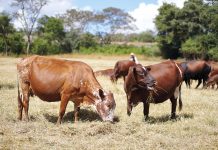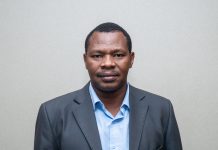By Joyce Chimbi
Nearly 1,000 people are participating in the Nairobi Evidence Week to help chart a new path for a foreign aid ecosystem beset by budget cuts amidst rising global needs. As growing financial constraints force governments to prioritize proven, shovel-ready interventions, the event is expected to help leaders leverage new evidence and insights to sustain progress in the fight against poverty.
Many African nations are now grappling with significant funding gaps in their economic and social development programs, threatening progress on critical sectors such as public health, food security, and education.
Within the context of global aid strategies shift and shrinking resources, evidence on the effectiveness of these programs can help decision makers do more with less. As such, the global development community is increasingly relying on evidence generators to chart a way forward following drastic cuts to foreign aid budgets.
In his keynote address, Macharia Kamau, Ambassador and Special Envoy of the East African Community Facilitator on DRC, spoke to the gathering on a wide range of issues, including the urgent need for Africa’s representation and inclusion in research.
Stressing that evidence is not neutral as it reflects the systems, values, authors, and power structures within which it is generated, “to create a more just world, we must build a more just evidence ecosystem, one where Africa is not on the margins, but at the centre. Because when Africa leads, global health is stronger, global knowledge is richer, and global equity becomes not just an aspiration, but a reality.”
“Let us not treat this as a moral obligation alone. Though it is that, let us recognize it as a scientific, economic, and human imperative, because lives depend on it, because truth matters, and because justice requires it,” he said.
Amb. Kamau spoke of the transformative power of research and evidence, and the urgent need to ground that power in equity, representation and local leadership, especially in Africa.
“We live in an age where decisions, whether about health, education, climate, or peace, must be driven by evidence. And yet, we also live in a world where the voices, experiences, and knowledge systems of hundreds of millions of people, particularly in Africa, remain sidelined or underrepresented in the very data that drives local and global action. This disconnect is not merely academic.
“It has real-world consequences. In medicines that don’t work for the people who need them most, in development programs designed without understanding local needs, in global crises where the most affected are the least heard, evidence is more than numbers and is more than just a spreadsheet. I’m sure you discussed this yesterday. It is fundamental and foundational to sound policy. It is the language of transformation. But like any language, it must reflect the voices of all people, especially those historically silenced,” he emphasized.
“That is why today I want to speak not only about the power of evidence, but also about who gets to generate it, how it’s used, and why centering Africa in this conversation is no longer optional. It is essential. Africa, as I’m sure many of you know, is the most genetically diverse continent on Earth.”
Additionally, Amb. Kamau noted that this is not just a biological fact but “a scientific imperative. Genetic diversity affects how diseases manifest, how medications are metabolized, and how treatment regimes should be designed.
“Yet despite this, less than 2% of global clinical trial participants are of African ancestry. This lack of representation undermines the quality, safety, and relevance of medical research, not just for Africa, but for the world.”
Amb. Kamau said this marginalization weakens clinical care, erodes trust in health systems, and perpetuates the inequality of outcomes, health outcomes. That it also limits the world’s ability to understand and address global health challenges.
“After all, how can science claim to be universal when it leaves out over a billion people? But the answer is not simply to include African populations as subjects in international studies. We must go further. We must support African scientists, institutions, and health systems to lead the research process, from framing the question to publishing the findings and implementing the results. Research by Africans, for Africans, and partnership with the world is not a slogan. It is a necessity,” he expounded.
“While healthcare research is a focal point, the significance of evidence extends far beyond the clinic. Evidence-based decision making has proven to be one of the most powerful tools for achieving economic development, social progress, and even political stability. Consider education policy.”
Importantly, Amb. Kamau encouraged the research community to speak, noting that “evidence, no matter how rigorous, is powerless unless it is trusted, unless it is understood, and unless it is accessible. The research community must speak not only in journals, but in parliaments, in schools, and in communities. We must train scientists not only to be discoverers of the truth, but defenders of it.”
The Nairobi Evidence Week, June 23-27, is co-hosted by Busara, the Center for Effective Global Action (CEGA), and the Network of Impact Evaluation Researchers in Africa (NIERA), and supported by the International Development Research Centre (IDRC) among other funders. The Evidence Week will feature five days of research presentations and policy panels attuned to the needs of African leaders.
“The IDRC supports evidence-informed economic development by funding locally led research that drives equitable, inclusive and sustainable policy solutions. Our participation in Nairobi Evidence Week reflects our commitment to strengthening Africa’s evidence ecosystem and ensuring that development decisions are grounded in data and local realities,” said Dr. Kathryn Toure, Regional Director, IDRC Eastern and Southern Africa Office.
The Africa Evidence Summit is organized by NIERA, an association of African scholars that advances decision-focused impact evaluation of development programs, and CEGA, a research hub at the University of California, Berkeley that generates innovative evidence decision-makers use to reduce global poverty. This year’s Summit will focus on “Better Data for Decision Making.”
Jennifer Nyakinya, Director of Programs at NIERA said that ongoing sessions and discussions were “a clear reminder of why we gather here each year, to exchange ideas, to forge narratives, and to build an inclusive evidence ecosystem. From the moment we opened with a keynote panel on foreign aid, we were invited to think differently about the funding landscape we’re operating in. The panel reminded us that change is a constant.”
Emphasizing that shifts in funding priorities and global attention are not new as they are part of a broader trend, she said, “even when international aid was at its peak, it was always small compared to the resources mobilized by local governments. That means our work, our partnership, our research, our policy engagement must centre on leveraging existing domestic resources and deepening local collaboration.”
Comprised of the Africa Evidence Summit, June 23-24, the Economic Science Association 2025 Africa Conference, June 26-27, and a day of collaborative workshops, Evidence Week will showcase a model of effective partnership fine-tuned for a new era of foreign aid.







